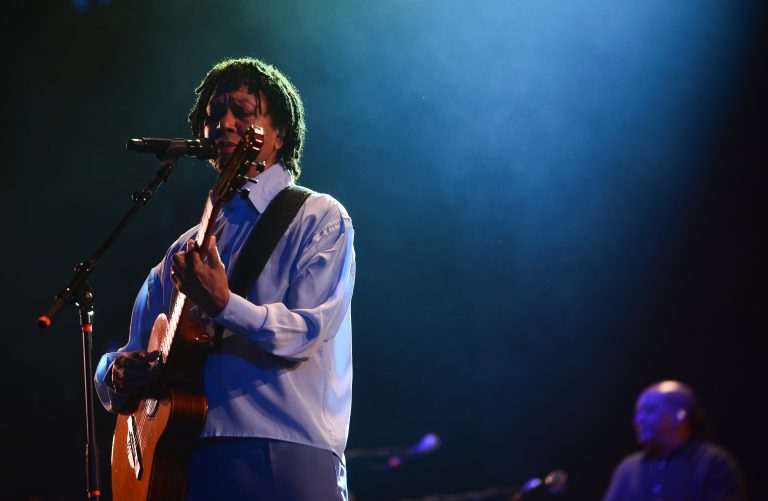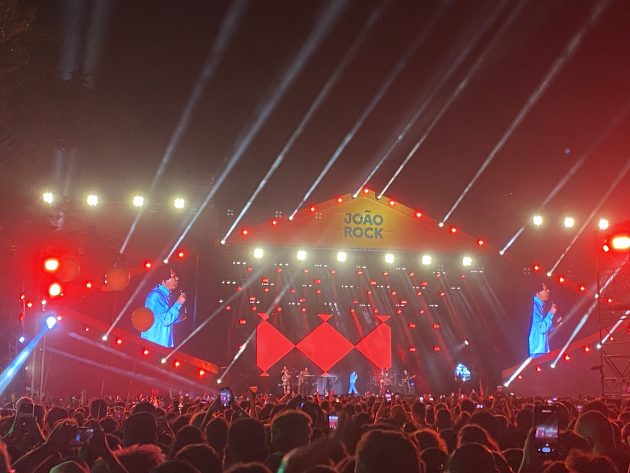
Singing Songs of Love: Djavan at João Rock
12 June, 2024One of my first experiences of live Brazilian music was a joint headliner of Gilberto Gil and Caetano Veloso performing Tropicália 2 followed by Djavan in the popular tourist attraction of Poble Espanyol in Barcelona. This was around 1994, so I imagine Djavan would have been performing from his recent album Novena, which was considered a return to form for him. Although I had been thoroughly impressed with the Caetano/Gil show, just the two of them facing each other playing what I still think is an excellent album, the Djavan show didn’t grab me in the same way. I found it too romantic, overly slick, with the girls in the front row hysterically screaming his name and desperately reaching over the barrier to touch this dreadlocked crooner. The evening was, however, a celebration, as it seemed that the entire Brazilian population of Barcelona was on hand to welcome their compatriots, one being my wife.
In the intervening decades my relationship with Brazilian music changed dramatically, to say the least; a period dedicated to searching out the interesting and different as I was trying to find my own Brazilian identity within the multiple strands and genres of Brazilian music. I have, after all, been living here for over 25 years, my children are Brazilian, my social circle is (mostly) Brazilian. So, that meant I transferred what appealed to me musically in Europe to what I was looking for in the music of Brazil. Therefore, that included lots of ’80s post-punk experimentation, electronica, and 60s psychedelic wig-outs. Unfortunately in doing this I ignored the mainstream, of which one needs a basic understanding so as to decode what makes the fringes so radical. I also, most importantly, ignored the craft of the song over sonic textures, and in Brazil “the song” is key. I mean, look at Os Mutantes: for all the fuzz guitar and innovative Rogério Duprat arrangements, they wrote brilliant songs.
Thus, my ongoing education to understand this mainstream is what brings me here to watch this show by Djavan and, at the same time, to delve in and attempt to appreciate his enormous back catalogue.

I am (back) at João Rock, the biggest festival in the interior of the state of São Paulo, specifically dedicated to the national music scene. The line-up is a wildly varied mixture of Brazilian heritage rock, Os Novos Baianos and 14 Bis, a healthy dose of new urban/R&B artists, such as Ebony and Duda Beat, and some cross-genre one-off partnerships like Pitty and Emicida. The interior of the country is the backbone of the agricultural industry and is renowned for being conservative politically and culturally, but this annual event is where the young and old alternative nations of the region come together and really let their freak flag fly. The place is absolutely rammed with over 70,000 people and there’s not a bad vibe in sight.
Currently there’s a saturation of festivals in Brazil, major names like Ludmilla and Ivete Sangalo have cancelled tours and other festivals have had trouble finding headliners and even available weekends to hold events, yet João Rock still manages to sell out and has outgrown its location with the sound of it’s six stages all bleeding into each other. It still has its charms: you can, for example, wander around and stumble across rapper Marcelo D2 doing a spontaneous and relaxed show on a tiny stage unannounced in the middle of the afternoon.
Djavan’s current tour is based around his 2022 album, D, an album I’m not too enamoured with. I find the tracks a bit noncommittal and lacking energy, but we are promised “more than 20 songs that span the various stages of his career”, so here’s hoping.
Djavan opens by dedicating this show to minorities, a tad sweeping, but OK: his heart is in the right place. He comes from humble beginnings in Alagoas, a small state in the northeast, and the backdrop projections are done by indigenous urban artists who are all credited at the beginning of the show. The band slip with ease into Djavan’s new material, his light jazzy-funky songs have a bossa swing and he still sings with a clear expressive voice, but it’s midnight and the crowd want to sing along to something they know. Then comes “Sina” and the crowd accompanies every word. Brazilian crowds are loved all over the word for a reason, they make a helluva noise, they sing every word, they almost compete with the stage to see who can make the most noise.
Most of the long-running acts at this festival play their hits, they haven’t produced anything new in decades, but Djavan, to his credit, has been producing constantly, he wants to play his new album. So there’s a noticeable difference between the new material, which is tolerated, even enjoyed, and the classics that everyone grew up with and wants. Also they want romance. Djavan has always said that he didn’t write protest songs like his compatriots, but that he wrote love songs to protest against a violent world, and love songs have become the most popular songs on his albums. And so it’s romance we get, as mid-set the pace slows down – from an already moderate tempo – for these love songs. One’s admiration for Djavan depends on your tolerance for his slow romantic songs, and there are many, but this quiet intimate acoustic moment is difficult to sustain with this weary late-night festival crowd. I’ve seen Caetano Veloso deliver an intimate acoustic show on this very same stage and turn it into a mid-afternoon party, but Djavan was struggling against the distant bass drum of the much louder main stage and when a low-flying jetliner passed overhead to land at the nearby airport his eyes visibly rolled.
The show comes to an end with “Samurai”, a great album track and live favourite, but delivered in a tired, offhand manner it seemed. A huge festival like this is far from the perfect setting for this show; it needs to be seen in a hall with an attentive crowd and the right acoustics. If he comes back to the region I’ll give him another go; there’s something there, his pan-American style has huge appeal, it just hasn’t completely won me over yet.
Three of the best by Djavan
If you’re curious and looking for somewhere to start try these three albums, one from each decade:
Djavan (1978)
This is his second album. The first really set his agenda and is rightfully acclaimed, but was maybe made more for the record company to show his skills. But this is where he really shows his strong songwriting: all killer and no filler, it’s a tight 36 minutes. Just listen to “Serrado” to hear his guitar playing, all strummed samba chords with jazzy flourishes. You can understand why so many musicians from Paco de Lucia and George Duke have been enchanted with it and wanted to play with him.
Luz (1982)
Arranged by Moacir Santos, it features Stevie Wonder playing harmonica on “Samurai”, which was considered a big deal at the time. This album demonstrates Djavan’s entrance into the North American market with a view to making him into an international star. This is classic mid-period peak Djavan, light on its feet bossa nova songwriting but with tight jazz instrumental backing. It sold in the hundreds of thousands and you can hear how he has merged his sound with an ’80s North American sound, but without losing his identity.
Novena (1994)
Probably his most personal record, he produces, arranges and composes the whole album and it is a hugely successful fusion of his style of bossa-jazz. It’s a lean record with an eye on his rural northeastern past, so you can hear frevo and baião as well as the blues. He avoids the keyboard sound of the last decade and works with just acoustic instruments, delighting in the challenge of working within restrictions.
My thanks to Francisco Capeda for the use of his photograph of Djavan.
Follow Sounds and Colours: Facebook / Twitter / Instagram / Mixcloud / Soundcloud / Bandcamp
Subscribe to the Sounds and Colours Newsletter for regular updates, news and competitions bringing the best of Latin American culture direct to your Inbox.

